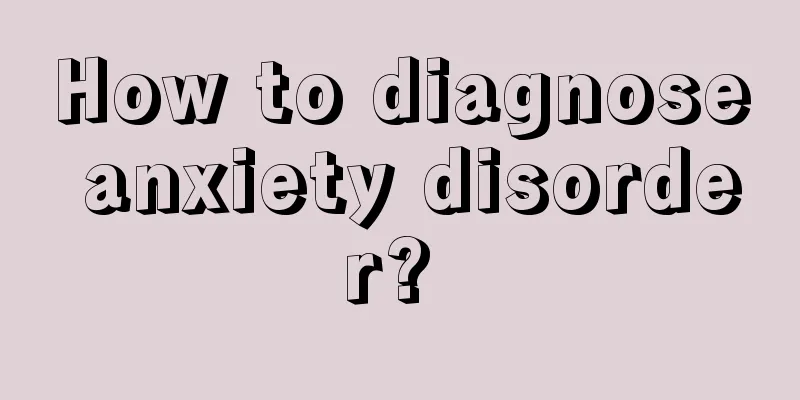How to diagnose anxiety disorder?

|
Everyone hopes that their studies and career will go smoothly, but there are always some annoying things that will affect the realization of their dreams. When our efforts are not rewarded and there is a big gap between reality and ideal, we can easily become anxious. If this emotion persists, it will be diagnosed as anxiety disorder. Let's take a look at how anxiety disorder is diagnosed. Anxiety disorder, also known as panic disorder, is a sudden panic experience characterized by severe feelings of suffocation, impending death, and mental loss of control, accompanied by severe autonomic dysfunction. Differential diagnosis can be made from three aspects: ① Heart symptoms: chest pain, tachycardia, irregular heartbeat; ②Respiratory system symptoms: shortness of breath, difficulty breathing; ③Nervous system symptoms: headache, dizziness, vertigo, syncope and abnormal sensation, and may also be accompanied by sweating, abdominal pain, a feeling of blockage in the throat, cold or fever in the body or hands and feet, etc. The manifestations of autonomic dysfunction associated with anxiety attacks involve various systems and lack specificity. These symptoms often cause patients to visit general hospitals or emergency departments first. These symptoms can also be the main clinical manifestations of certain physical diseases, so the differential diagnosis of acute anxiety disorder is very important. Anxiety disorders can occur at any age, but are more common in young and middle-aged people. For example, during adolescence, due to the rapid growth and development of the body and the emergence of secondary sexual characteristics, teenagers may feel mysterious and even at a loss about their body shape, physiological and psychological changes, and may experience symptoms of adolescent anxiety such as fear, tension, shyness, loneliness, inferiority, sensitivity, worry, dizziness, shortness of breath, and emotional instability. What are the symptoms of severe anxiety disorder? People are most likely to suffer from anxiety disorders when they are under great work pressure, have a heavy psychological burden, or are emotionally tense. Anxiety disorders are divided into two categories: mild anxiety disorders and severe anxiety disorders. Anxiety disorder is a brain dysfunction characterized by persistent anxiety, fear, tension and autonomic nervous system activity disorders, often accompanied by motor restlessness and physical discomfort. The disease occurs in young and middle-aged people, and there is no significant difference in the incidence rate between men and women. In order to give everyone a detailed understanding of anxiety disorder, let’s take a closer look at the emotional state. Anxiety is an emotional state. The patient's basic inner experience is fear, such as being nervous, uneasy, or even extremely panic or terror. Paroxysmal or persistent occurrence of inexplicable fear, tension, anxiety, phobia, and uneasiness. The patient may have an anticipatory sense of danger, a sense that some kind of disaster is about to happen, or even a sense of death. Many patients also suffer from depressive symptoms and lack confidence and interest in their current and future lives. Sometimes I become emotional and lose my balance, often get angry for no reason, quarrel with family members, and am dissatisfied with everything. Confused. The patient will feel inexplicably anxious all day long, like an ant on hot pot, restless and not knowing what to do. Sometimes, just after starting one thing, they will turn to something else, with an obvious lack of purpose and persistence, as if they keep moving just to resist panic. There is actually no threat or danger. The anxiety and fear experienced by patients are very different from reality. That is, there is no actual threat or danger, or, measured by reasonable standards, the anxiety-provoking event is disproportionate to the severity of the anxiety. In their daily lives, patients should go to squares or gardens with fresh air to take walks and see nature more often, which is helpful in relieving anxiety. Avoid going to crowded places such as supermarkets, especially when anxiety disorder has just occurred. You should learn to control your emotions and calm yourself down. This can often allow anxiety disorder to heal on its own. However, even if the anxiety disorder is under control, we still need to go for regular follow-up visits. |
<<: What causes frequent urination, urgency and lower abdominal discomfort?
>>: What is sleep apnea syndrome?
Recommend
What are the dietary methods that can be used to nourish qi and blood for breast cancer?
Breast cancer is one of the common malignant tumo...
How to treat myofascial pain syndrome
Myofascial pain syndrome requires timely treatmen...
The efficacy and function of ginger foot bath
When winter comes, many people will have problems...
Abnormal thyroid secretion
The thyroid gland is an important organ of the hu...
Dink treats onychomycosis
I wonder if you have ever heard of this so-called...
Atrial fibrillation and atrial flutter
The heart system can be said to be the most impor...
What are the antemortem care methods for pancreatic cancer
The early symptoms of pancreatic cancer are not v...
What are the clinical manifestations of early stage colon cancer?
The colon starts from the cecum and ends at the r...
Several measures to prevent cervical cancer
Cervical cancer is a common disease in life. Afte...
Can Wuzhi soft capsule be taken for a long time
Wuzhi soft capsule is made from Schisandra chinen...
Supplementary medical insurance
Do you know what supplementary medical insurance ...
How to do pathological sections
Clinically, there are many types of diseases. Som...
What to do with the curls in the front hair
Some people will perm and dye their hair to make ...
What are the fastest foods to fight fatigue?
Fatigue is a very common phenomenon in life. Ever...
Side effects of fluid extraction
The incidence of liver disease is very high now. ...









